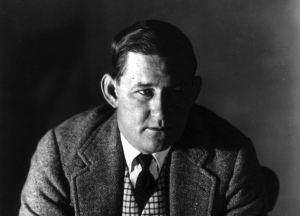“If you want to read a book by a man who knows exactly what he is writing about and has written it marvelously well, read Appointment in Samarra.” -Ernest Hemingway
That’s pretty high praise from Papa.
And having completed Appointment in Samarra, I must agree. This is a fabulous novel.
I’ve heard Appointment in Samarra called a “Poor Man’s Gatsby,” and I believe that’s a perfect description.
John O’Hara’s story focuses on a man named Julian English, a late-twenties socialite in small-town Pennsylvania. Along with his wife Catherine, Julian is part of the ritzy country club scene in Gibbsville. Much of the novel takes place in this setting.
Julian begins a downward spiral when he throws a cocktail in the face of a prominent businessman in Gibbsville. After that, one lapse in judgment after another takes Julian down a brutal, self-destructive path.
While Gatsby is told from the point of view of Nick Carraway, Appointment in Samarra is told from the point of view of the all-seeing, all-knowing narrator. And with Gatsby, a lot of drama happens “off stage,” like Gatsby’s business dealings and specifics of his nights with Daisy. But in this story, O’Hara lays it all out in front of you.
You’re going to get all up in Julian English’s business, and you’ll also learn what everyone in Gibbsville thinks about him throughout his journey to self-destruction.
One possibly unique aspect of this novel is that I’d estimate half of the story is told through flashbacks. We learn how Julian and Catherine met. You might remember this flashback passage I shared with you recently:
“When Caroline Walker fell in love with Julian English she was a little tired of him. That was in the summer of 1926, one of the most unimportant years in the history of the United States, and the year in which Caroline Walker was sure her life had reached a pinnacle of uselessness.”

John O’Hara (Source: Wikimedia Commons)
We learn how a local mobster’s lackey became a mobster’s lackey. We learn how a lot of the country club crew came to be.
O’Hara manages the transitions well. Both the timing and content of the flashbacks fit with the story and give you a better sense of the characters as a whole.
He’s an outstanding dialog writer, easily one of the best I’ve read. I think that’s what makes Appointment in Samarra so approachable and entertaining.
Quotes like this will keep you turning the page.
“And so what you did, what you did was take a knife and cut me open from my throat down to here, and then you opened the door and let in a blast of freezing cold air, right where you had cut me open, and till the day you die I hope you never, never know what it feels like to have someone cut you open all the way down the front of you and let the freezing blast of air inside you.”
Someone is feeling a bit scorned, yes?
I can’t recommend this novel enough, especially if you grew up in a small town. Appointment in Samarra is an outstanding read.
Other Stuff
The Opening Line: “Our story opens in the mind of Luther L. (L for LeRoy) Fliegler, who is lying in his bed, not thinking of anything, but just aware of his sounds, conscious of his breathing, and sensitive to his own heartbeats.”
The Meaning: The title comes from a W. Somerset Maugham play called Sheppey: “I was astonished to see him in Baghdad, for I had an appointment with him tonight in Samarra.”
Highlights: Entertaining story. Lively, even relatable, characters. Through a lack of self-control, the main character Julian English often does things that most of us simply think about. He’s an equally-awkward, equally self-aware, much less funny version of Michael Scott from The Office.
Lowlights: The focus placed on a few of the more minor characters, especially their backstories, seem tangential to the overall story. But, still, they were entertaining and easy to read.
Memorable Line: “The road was his. He wanted to drive on the left side and zigzag like an army transport and idle along at four miles an hour. But one time when he thought the road was his he had done all these things, finally to be arrested for drunken driving by a highway patrolman who had been following him all the while. “You’d think you owned the road,” the patrolman had said; and Julian could not answer that that was exactly what he had been thinking.”
Final Thoughts: Great, fun-to-read novel. Even though you kind of know what’s coming, and even though what you know is coming is sad and dark, somehow O’Hara makes this an enjoyable book. Thumbs up for Appointment in Samarra.

